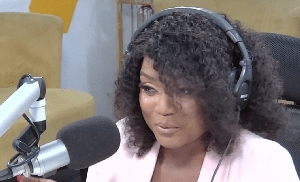Embark on a journey through Ghana's musical diaries, and you'll encounter a celestial force in the form of a female vocalist. Discovered in 1999, she chose the shadows, lending her extraordinary voice to the nation's hits, becoming the unsung melody behind the stars.
Unveiling her story reveals a voice that is not just harmonious but a vivid narrative itself—a tale of resilience and brilliance, waiting to resonate beyond the background.
Yvonne Ohene-Djan, also known as Nana Ama SHE, was initially a rapper in a music group before her singing talent caught the attention of Jeff Quaye, a prominent music producer known as Jay Q in the showbiz space. Jay Q shared his encounter with SHE in a Facebook post on September 10, 2020.
“It was around 8:30 pm in 1999. I had reached CHM (Mataheko) to work with a student group named ‘Cow & Chicken’ when I saw this girl standing next to where I’d parked my car,” Jay Q recalled.
As curious as Jay Q was, he asked about her mission, and she mentioned being with the ‘Cow & Chicken’ group, identifying herself as a rapper.
After she rapped upon Jay Q's request, he inquired if she could sing. She responded, “A little,” implying she was a better rapper than a singer.
“I encouraged her to sing any song of her choice,” said Jay Q. “The moment she opened her mouth to sing, I knew she would be a blessing to Ghana music. I looked her in the eye and told her ‘You’re not a rapper, you’re a singer.’ I then made sure every opportunity I had to work with artists, I recommend this lady to them for choruses.”
And that was SHE’s journey to working with stars with her captivating, melodious, and soulful voice.
From Daddy Lumba’s hits like 'Asieho,' 'Ayehuhuuhu,' and 'Nana Ye Winner' to Bradez’s 'One Gallon,' Mzbel’s '16 Years,' Becca’s 'Daa Ke Daa,' and Obour’s 'Konkontiba,' SHE has established herself as a highly-skilled backing vocalist for numerous Ghanaian chart-toppers. Notably, she has lent her exceptional vocal talents as a backing vocalist for over 20 songs of Daddy Lumba alone.
A glance through her catalogue by GhanaWeb reveals her indispensable role in the success stories of many Ghanaian favourites, including Kwabena Kwabena, Ofori Amponsah, Okyeame Kwame, Samini, Kofi Bee, Daasebre Dwamena, Rex Omar, Castro, Tinny, Dada KD, KK Fosu, Nana Acheampong, Ohemaa Mercy, R2Bees, Sidney, Reggie Rockstone, Ps. Josh Laryea, Patience Nyarko, Terry Bonchaka, No Tribe, Great Ampong, and DSP Kofi Sarpong, among others.
“She will always add a touch to what you give her,” said Jay Q in a recent interview on 3FM. “She will recreate. Sometimes, she will come to the studios and I’ll tell her this artiste doesn’t have a chorus and she will create choruses. Her creativity is off the roof.”
Rex Omar’s ‘Dadadida’, one of the biggest Highlife tunes ever produced had her contribution. SHE was the one behind the beautiful voice that sang the chorus of the 2004 monster hit song.
"SHE is more like my daughter. In fact, there are certain songs that I write, and if SHE is not there, I won’t even think of recording them; she knows that," the music legend spoke fondly of SHE.
“SHE is one of the major players in the music industry. I have pushed her so many times to come to the forefront [but] she says no; she just wants to be behind the scene,” Rex Omar added while showering her with praise. “SHE needs to be honoured; she’s very talented and she knows she’s everybody’s darling.”
In honoring and celebrating SHE’s achievements and contributions to the Ghanaian music industry, Obour, a rapper and former president of the Musicians Union of Ghana (MUSIGA), disclosed how her suggestion birthed ‘Konkontiba’, a song (title track) that won him the Most Popular Song of the Year award at the Ghana Music Awards 2004.
Describing SHE as a "pillar in the music industry", Obour elaborated on how crucial she was in the success of his third album. According to him, not only did SHE suggest a song like 'Konkontiba,' but she also played a significant role in the decision to feature Samini on the record.
“SHE made ‘Konkontiba’ possible,” said Obour in a 3FM interview. “I finished working on the album but I didn’t have ‘Konkontiba’ on the album. I gave the CD to SHE to listen. After listening to the album, she said the album doesn’t have a song for girls, a song that girls can also sing and so we started thinking through. Then the whole concept of ‘Konkontiba’ came up.”
He continued: “When we finished recording the song, the song didn’t have Samini on it. Then she suggested and called Samini and that’s how Samini came on the ‘Konkontiba’ song.”
The music business has proven lucrative for SHE, even though she offered free services to certain musicians as they didn't officially engage her. According to her, after listening to their songs in the studios, she felt compelled to contribute. And whenever she laid her voice on their works, it undeniably gave life to the songs.
“I did a lot of the songs for free,” said SHE. “When I enter the studio and they’re playing the song and the person doesn’t have a female voice on it, I listen and suggest that a lady should sing. When I’m done, because I chipped in, I don’t charge. If I charge, it messes up the blessings I would have.”
SHE maintained a firm stance on receiving payment before executing any task for those engaging her services. In rare instances where she demonstrated flexibility by proceeding without immediate payment, after completing the job, non-receipt of her due would result in her reluctance to consider another project with the same musician until the arrears were cleared.
“Those who engaged my services, I charged them. For those who promised and never paid, I would never return to the studio. And they know that. So, whenever they had work for me, they’d pay the debt,” she said.
Her advice for women is straightforward – to stay determined and never yield to requests for exchanging sex for favors.
“Consider patience because if not, you won’t get to where I’ve gotten to,” she said, adding: “Stand on your grounds. Never sleep with anyone. If they tell you they’ll sleep with you before they give you the job, walk away.”
Having worked with most of the heavyweights in the Ghanaian music industry since her discovery in 1999, SHE’s contribution to the music scene is summarized by the one who discovered her singing prowess.
“Ghana music wouldn’t be what it is now without some people like you [SHE],” the words of Jay Q.
BB
Entertainment of Monday, 4 March 2024
Source: www.ghanaweb.com

















